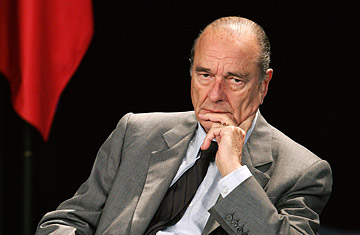
Former French president Jacques Chirac
When asked in a 2001 television interview about the numerous corruption allegations that had dogged him throughout his years of public service, then-President Jacques Chirac waved the notion away as nothing but hot air. That changed on Friday, however, when a judge ordered Chirac to stand trial for alleged abuse of public funds while he was mayor of Paris just before his election to the Elysée.
Although Chirac has been the subject of multiple investigations relating to his 1977-1995 tenure as mayor, the inquiry headed by magistrate Xavière Simeoni is the first to come even close to prosecution. The conclusion of Simeoni's nearly decade-long inquiry marks a dramatic moment for the nation — if the case does go to court, Chirac would be the first former head of state to stand trial since collaborationist leader Phillipe Pétain after World War II. He would also be the first ever to face a corruption trial.
The case focuses on a false employment scheme that Chirac was allegedly involved in toward the end of his time in the mayor's office from 1994-1995. Chirac and members of his City Hall staff are suspected of having created nearly 500 fictional consulting jobs for members of Chirac's conservative party — a way of paying people for political work out of public coffers. Twenty-one of these suspicious positions are cited in Simeoni's dossier. Chirac was constitutionally banned from giving testimony in the case while he was president from 1995-2007, but he admitted after leaving office that he took part in the decision to create the jobs and assign them to certain supporters, although he maintained that they were legitimate and provided valuable work for the city. Nine former aides have also been ordered to face corruption charges.
Reaction from Chirac's office was swift. In a statement released Friday morning, it said the former president was "serene" and "determined to prove in court that none of the jobs still being debated were fake." Chirac also made it clear he wished to be treated "like any other citizen before the law."
But a trial is far from certain. Paris prosecutor Jean-Claude Marin has already advised that the charges be dropped as groundless. Under French law, he now has several weeks to petition an appeals court to overturn Simeoni's ruling — a move he looks certain to make since he previously told the judge he believed the evidence against Chirac was too weak to take to trial.
Nor does Chirac's prosecution have much support among France's politicians — both on the right and left. Conservatives point out that the allegations are 15 years old and say a trial only risks sullying the image of a 76-year-old man still considered to be among the most popular public figures in France. According to a survey conducted earlier this month by the Ipsos polling company, Chirac enjoys a 76% approval rating.
Many leftists who once vilified Chirac as sleazy and a political street brawler also see putting him on trial as unnecessary. "Jacques Chirac doubtless has a lot to answer for if justice authorities are pursuing him, but he's also given a lot for this country," former Socialist presidential candidate Segoléne Royal and long-time Chirac detractor said on Europe 1 radio Friday morning. "Today, he's a man who deserves to be left alone." Socialist Party spokesman Benoît Hamon also voiced concern about a trial. "There are laws to uphold, but it's true it doesn't to the image of France much good abroad when one of its former presidents is hauled up in court," he said.
Why the collective shrugging in France at the charges? Part of the reason may be that other illegal political funding schemes were commonplace in France from the 1970s to the early 1990s when a series of laws were passed to crack down on the practice. The French also tend to be more scornful of public officials who use corruption to enrich themselves personally, which Chirac isn't accused of doing in this case.
But there's also a sentiment that many members of France's political class may wind up discredited if too many old corruption cases are dredged up now. Earlier this week, several public figures — including former Interior Minister and Chirac confidant Charles Pasqua and Jean-Christophe Mitterrand, son of former President François Mitterrand — were convicted of illegally supplying arms to Angolan rebels in the 1990s. In responding to his guilty verdict and one-year prison sentence, Pasqua said that many former and current members of government knew about the arms sales, as well as several other illegal schemes. The comments suggested that Pasqua expected political help in the case — or he was prepared to take a lot of people down with him.
There's still a chance that Chirac won't see the inside of a courtroom, given the likelihood that Marin will appeal Simeoni's decision to send the case to trial. Even if the appeal is granted, however, it seems unlikely Chirac would try to use his hot air line again.
